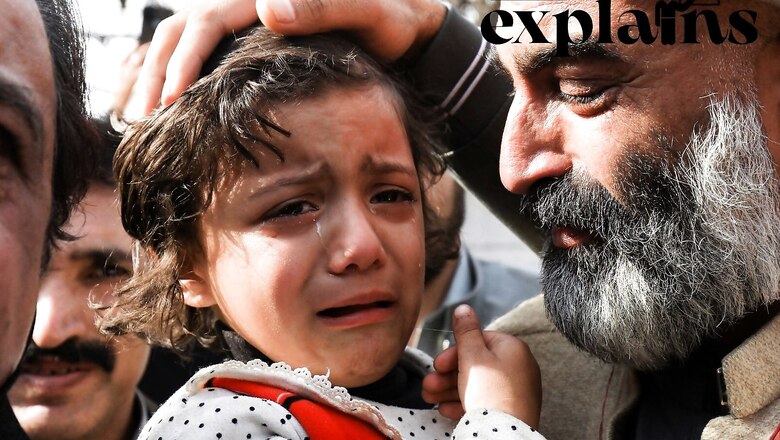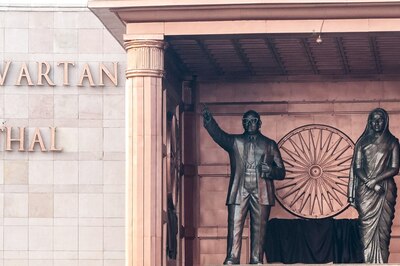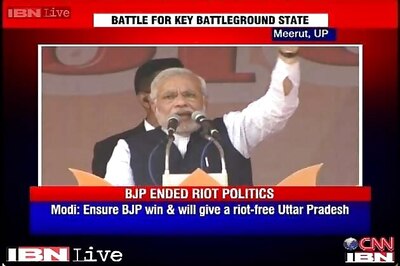
views
Lawmakers from the ruling Pakistan Muslim League Nawaz (PMLN) reportedly criticised the previous Pakistan Tehreek-e-Insaf (PTI) regime’s counter-terror policy in the country’s first cabinet meeting since the deadly suicide blast at a mosque in Peshawar on Wednesday, as reported by the Dawn.
According to the report, Pakistani lawmakers also claimed that the National Assembly had never agreed with the previous Imran Khan government’s counter-terrorism policies and strategies. It said PTI officials now regret the “faulty” decision to negotiate with militants and allow them to resettle in the country during their administration.
The Dawn report said both PMLN ministers of defence, Khawaja Asif, and interior, Rana Sanaullah, were critical of the previous regime.
Let’s take a detailed look:
Peshawar Blast
A suicide bomber struck a mosque inside a police compound in the northwestern city of Peshawar on Monday. Hundreds of police were attending afternoon prayers in what should have been a tightly controlled compound. When the blast erupted, it caused a wall to collapse and crushed officers; according to the latest toll 84 have died.
Authorities are investigating how a major breach could happen in one of the most sensitive areas of the city, which houses intelligence and counter-terrorism bureaus and is next door to the regional secretariat.
It is Pakistan’s deadliest assault in several years and the worst since violence began to resurge in the region after the Afghan Taliban takeover in Kabul in 2021.
Authorities are also investigating the possibility that people inside the compound helped to coordinate the attack, a senior city police official told AFP on condition of anonymity on Wednesday.
“We have detained people from the police line (headquarters) to get to the bottom of how the explosive material made its way in and to see if any police officials were also involved in the attack,” he told AFP. The police official said at least 23 people had been detained, including some from the nearby former tribal areas that border Afghanistan.
The assault has put a scarred city on edge, harking back to more than a decade ago when Peshawar was at the centre of rampant militancy carried out by the Pakistani Taliban (TTP) before a clearance operation flushed them into the mountainous border and Afghanistan.
Analysts say militants have become emboldened since US and NATO troops withdrew from Afghanistan and the Taliban swept into Kabul, with Islamabad accusing them of failing to secure their borders.
Security forces have since become the target of increasing low-level attacks, often at checkpoints.
The assaults are claimed mostly by the TTP as well, as the local chapter of the Islamic State, but mass casualty attacks remain rare. The TTP has distanced itself from the Peshawar mosque blast, claiming it no longer attacks places of worship. However, police said authorities were investigating whether an occasional affiliate of the group was responsible.
Has Terrorism Increased?
Pakistan has seen innumerable militant attacks in the past two decades, but there has been an uptick since November, when the TTP ended a cease-fire with the government that had lasted for months.
The Pakistani Taliban regularly carry out shootings or bombings, especially in the rugged and remote northwestern Pakistan, a former TTP stronghold.
The violence has raised fears among residents of a possible military operation in the former tribal regions of North and South Waziristan, now two districts in Khyber Pakhtunkhwa.
Hours after Monday’s mosque bombing, Interior Minister Rana Sanaullah Khan told the independent Geo news channel that Afghan Taliban rulers must stand by their commitment to the international community to not allow anyone to use their soil for attacks against another country.
“They should honor their promises,” he said.
What are Current Lawmakers Saying
The report by Dawn said that in the cabinet meeting, Khawaja Asif claimed that briefings during the PTI era were ‘inconclusive,’ with Opposition leaders only being informed of finalised decisions without having a vote on them in the National Assembly.
“The House had not approved the earlier decisions from around two years ago. The only place we found out this decision had been made was in the briefings. Who will be held responsible, now, for this slaughter?” he is quoted as saying.
‘When the Russian troops entered Afghanistan, we sowed the seeds of terrorism and rented out our services to the United States,’ he continued.
It was reported that Sanaullah stated that PTI had claimed that 8,000 terrorists should be given the opportunity to surrender because some 25,000 family members, including children, were also associated with them.
Sanaullah said, “this decision may have been made in good faith but this policy proved wrong,” referencing the increase in terrorist attacks in Pakistan.
The minister is quoted as saying that the PTI government freed thousands of militants who had been incarcerated, including some who had been given the death penalty.
“The prime minister and the top brass of the armed forces must keep this legislature in the loop. Parliamentary discussion is warranted,” he said. According to the report, he said that he wanted the lawmakers to propose some sort of solution.
Mushahid Hussain Syed and Tahir Bizenjo, both senators for the PML-N, have called for a review of the government’s stance on terrorism and Afghanistan.
With inputs from AFP, Associated Press
Read all the Latest Explainers here




















Comments
0 comment